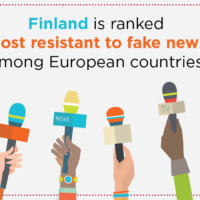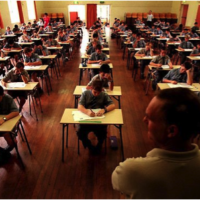Finland Teaches Students to Recognize Fake News

Finland ranked first among 41 European countries on resilience against misinformation for the fifth time, on a survey published by the Open Society Institute. Media literacy is part of the national core curriculum, starting in preschool. The goal is to help students learn to identify bias and false information in the media they consume. A New York Times article explores Finland’s approach to teaching media literacy in its schools and what other countries might learn from it.
Germany Proposes Paid Leave for Educational Training
The German government wants to offer paid leave for workers to participate in training, in an effort to upskill the nation’s workforce in the face of a “digital skills gap” and shortages of workers in key sectors like medicine, care services and mechanical engineering. The proposed legislation includes paid educational leave for up to a year.Until now, Germany’s efforts to upskill its national workforce have focused on apprenticeships that are typically undertaken by youth just out of secondary school and unpaid training.This plan will target mid-career professionals for the first time. Labor Minister Hubertus Heil says that the program is modeled on similar programs throughout Europe, including Austria, Poland, Portugal and Luxembourg. Read more here.

Australia Updates National Assessment Program

Australia’s federal, state, and territory education ministers have agreed to make substantial changes to the country’s National Assessment Program for Literacy and Numeracy (NAPLAN), standardized tests administered annually to students in third, fifth, seventh, and ninth grade. Starting this year, the testing window will be moved up from May to March, and the tests will be administered entirely online. This is aimed at making the results available sooner so that they can be used during the school year. Additionally, NAPLAN’s proficiency levels will be streamlined from ten to four— exceeding, strong, developing, and needs additional support—to help parents and schools more easily interpret students’ results. The Australian Curriculum and Assessment Reporting Authority, which administers NAPLAN, will convene a panel of teachers to set the cut scores for each of the four proficiency levels, including raising the minimum proficiency level. To read more about the updates, visit news.com.au or The Conversation.
Canada Will Develop a National School Food Policy
Canada’s Employment and Social Development (ESDC) agency recently announced the government’s intention to create its first-ever school food policy. School meal programs exist in each of Canada’s provinces and territories, but there are no national guidelines or monitoring of the scope or quality of the programs nor are any federal funds invested. The Liberal government promised in its 2021 platform to invest CAN$1 billion over five years to develop the policy. In November 2022, ESDC launched public consultations on the policy and have been gathering input from stakeholders on what they would like to see in the new policy. Judy Barry, co-founder of the Breakfast Club of Canada which supports thousands of school food programs across the country, welcomed the plan but said Canada is behind other nations in not having one in place. She said “It’s about time that we’re moving in that direction.” For more, see MSN.





